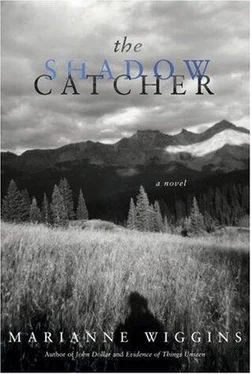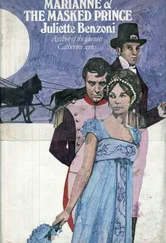Edward thought the Stieglitz point of view was junk, though Clara championed it.
“I’m not convinced,” was his final verdict whenever they discussed it. “A photograph shouldn’t be , it should tell you what some thing is .”
He worried, in light of the Harriman expedition debt, that his photographs weren’t interesting . He worried that his focus, that the subjects that he chose, were falling short of capturing the public’s interest. So he was wary when Bird Grinnell wrote to ask if Edward would accompany him on a journey to Montana that next summer to be among the few white men invited to attend the Plains Indian Sun Dance.
“I am loath to bring my camera,” Edward wrote back, in acceptance.
“But you must ,” Grinnell responded.
In purely economic terms Clara could not see how the business could sustain another out-of-pocket cost. Their bread-and-butter, Edward’s society portraits of debutantes and heirs, was already showing symptoms of decline owing to his absences. “Mr. Curtis oversees each print himself,” was her front office line when clients voiced their disappointment that Edward, personally, was not behind the camera, but, “Mr. Curtis oversees each print himself,” could hardly float when the Seattle papers advertised that Edward was in Alaska for two months. Or going to Montana. She had cut costs everywhere she could — she had no domestic help, herself, in a household of eight people, except for a laundress and a daily char. She employed a part-time woman, when she could, to help her cook and although she resented Eva’s passive presence in the household she was reluctant to ask either her or Edward’s mother to take on the duties of a servant. She encouraged Eva to develop interest in the business, in the darkroom processes, but Asahel, alone among the Curtises, was the only one on whom either she or Edward could depend for active help, and his absence in Alaska had been sorely felt. Still, she knew, the person on whom all of them depended most was Edward — and if he was determined to make the journey to Montana she would help him any way she could.
Little did either know that love was waiting.
As it always does: in ambush.
On the evening of his departure Clara heard Edward come home as she was putting the children in their beds upstairs. She heard the front door close and heard his footsteps toward the study. Minutes later she heard the front door open and close again and then the sound of other footsteps toward the study and within moments after that she heard the sound of two male voices raised in heated argument, below. She put the children down and closed their doors and went to listen on the stairs.
Edward had never raised his voice in all the time she’d known him.
But he was shouting now — and the voice that countered his and overpowered it, was one she recognized:
Asahel, returned.
She crept forward ’til she reached the bottom tread.
As best as she could fathom, through the door, Asahel was shouting about shadow , about being overshadowed all his life by his older brother, every act of his own “ stolen for the greater good of Edward! And now my photographs —”
“—it is common practice for a studio to sign its name…”
“— ‘its’ name! But the name you printed on my photographs says ’Edward Curtis’ —”
“—that’s the name of—”
“—not the ‘ studio of Edward Curtis.’ Ed…ward…Curt…is! ”
“— yes ! The man who paid for you to make those pictures—”
“—the man who paid ? — so that gives you the right to own them—?”
“—absolutely.”
“I swear I hope this comes to bite you on your backside one day, brother.”
“Get out of my house—!”
Despite herself Clara had edged into the entrance hall to hear them and the sudden violent exit of Asahel caught her stranded, off her guard, as he slammed the study door behind him and swept past her in impassioned heat. Several feet away from her he stopped and turned and swung around to her, forcing her against the banisters, feeding her his mouth until she couldn’t breathe. She raised her hand to strike him but he caught it in mid-air, and then released it.
“Now you know ,” he said: “You married the wrong brother.”
Then he was gone.
Clara took several minutes to compose herself, then rapped on Edward’s door.
No! came the answer.
He would never speak to Asahel again, so long as they both lived.
If he saw him on the street, in Seattle, he would cross to the other side and not acknowledge him.
Such were the things playing on Edward’s mind when he left Seattle for Montana — and whether it was his doubts about his own career, in the public’s seeming lack of interest in the photography he cared about, or whether it was his doubts about his words and actions toward his brother — or neither of these things — when Edward reached his destination on horseback he was in a frame of mind that was, uncharacteristically, open to emotion.
And what he saw was like nothing he had seen before.
He had traveled out by train to Butte where he and Bird Grinnell had hired horses and they’d camped a night and then pressed on to where the several tribes of Sioux — Lakota, Apsaroke, Piegan — were gathering as one great nation.
Their approach was from higher ground and as they neared, Edward saw the Sioux had chosen a broad geological depression in which to congregate their tipis, all white and of the same design but different sizes, hundreds of them, thousands, arrayed across the valley floor like totems from another world and as he gazed down at them he had the sense that he was flying, flying out of present time into a visible history, and later he would write that in that moment he experienced the most profound feeling of emotion in his entire life.
Love.
He would never call it that, but Clara knew it in a heartbeat, as soon as he began to try to tell her why he had to go, go back to the place where he had felt it first, keep going back, to try to reinstate that moment of original devotion.
In 1900 he was gone five months.
The next year, seven.
Following Clara’s good advice he wrote the children letters from the field as if, in his imagination, they were right in front of him — and they thrived on eighty words, perhaps a hundred, for as long as he was gone.
He took Harold with him, every summer, and Harold, following camp protocol, was the first among the children to begin to call him “Chief.” Home for a rare visit when Harold was thirteen, Edward informed Clara that he had arranged for Harold to be educated by some friends of Mr. Roosevelt’s “back East.”
“What do you mean? — what ‘friends of Mr. Roosevelt’s’?”
“A banker and his wife living on Long Island. Childless. Harold will live with them and they will pay his schooling.”
“Harold has an education here .”
“He’s going to New York.” Then: “Don’t look at me that way, Clara. You let your brother go, and he was younger.”
“They gave you money, didn’t they?”
He waved her off.
“You sold your son.”
“It will be good for him.”
“—it will be good for you .”
“He will thank me later.”
“—and who in God’s name will you ever thank?”
After Asahel had left, the Curtis women had moved in with him — and with Harold gone, and Edward gone most months, Clara was alone with Beth and Florence in a house that suddenly seemed too big, with too many rooms. She looked into the possibility of selling it but discovered there were several liens against it and when she advertised for female boarders she was surprised to find that not a single applicant was willing to pay rent in a household that included children. Her children were, after all, her single greatest joy, their laughter echoing in the empty entrance hall, proof that happiness existed, even in a vacuum, and that her life had had a purpose and a meaning. Beth and Florence, in their banter and their games, mirrored what was best about the life that she had made with Edward, and she kept his accomplishments and his adventures in the forefront of their conversations so they would remember him, so he would remain a presence in their daily lives. But the truth was, without Harold to remind them of the energy of boyhood — and with an absent father — the household became, inevitably, centered around girlish things, reading stories, playing make-believe in dress-up clothes and linen sheets discovered at the bottom of their mother’s painted trunk. The games they played, the stories she encouraged them to tell to each other, established heroes in their minds — princes on white horses slaying dragons, impoverished boys who learn one day that they are kings. The men they saw each day, however, were the milkman and the greengrocer down the street, the trolley driver and the man who swept the gutters.
Читать дальше











